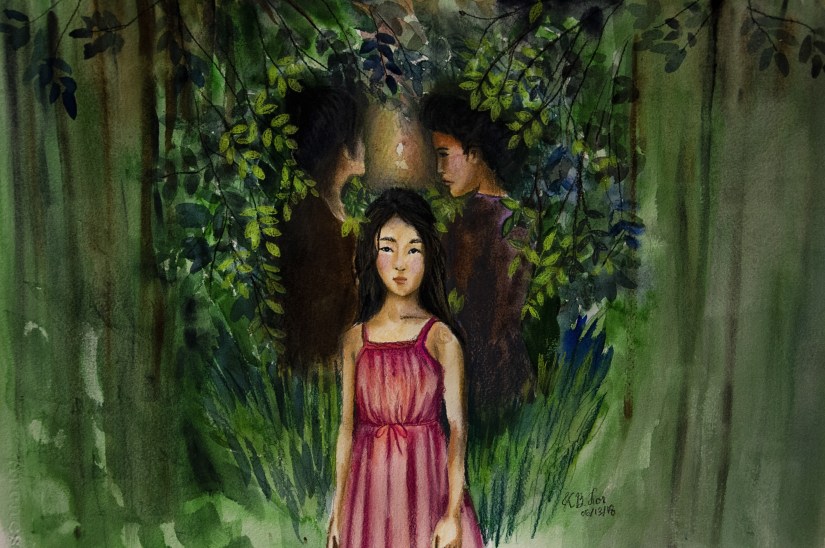
How We Nourished Each Other When the Fridge Was Empty
Image by KB Lor, © All Rights Reserved.
The gray was around us. The sun was not yet present in the sky. The clouds of morning misted the world we lived in. My grandmother and mother moved quietly on the padded carpet of grass, still wet with dew. They brought to mind ninjas, but neither of them clad in black, slim of figure, or that fleet of foot. Instead, they stood two short Hmong women, one heavy with age, and the other still young, but wearied by life.
We lived in the McDonough Housing Project. Most of the windows of the townhouses were still dark, holding away the light of day, so that their tired inhabitants could continue their night’s rest. But we were up, and we were about to harvest our morning greens from the city’s ash trees.
I imagine some long ago morning, when the Hmong had just arrived in St. Paul. I imagine an old man, an old man like the relative who had told my grandmother about the edible trees — thin and tall and respected in the community, a dignified early riser who was up and about before the city’s alarm clocks went off— going outside for a morning stroll in the lonely new world. It was early spring, so the budding trees had just unfurled their young leaves. The man walked with his hands behind his back on the sidewalk up Timberlake Road. He passed by an ash tree, and its leaves brushed his shoulder like a long-ago friend. He looked up. Perhaps he saw in the shiny green leaves a plant he had once loved in Laos or a memory of something he’d eaten before and liked.
In a moment of curiosity, a moment of missing, the old man reached his thin fingers toward the leaves. He felt the softness of the greens. His used his thick nails to pinch the single leaf from the tree. Inspired, he placed it in his mouth. He chewed carefully and slowly with his old man’s teeth. The taste filling his mouth was chalky and bitter. The texture was smooth on his tongue. He swallowed.
The minutes and the hours passed, and the day slipped away, and the next morning he was alive and he was once more walking by himself in the early morning. This time he stopped purposely by the friendly tree, and instead of one leaf, he pinched a full hand of leaves and stuffed them in his mouth. He chewed and swallowed, and perhaps the day after or the one after that, he decided he would share the taste of the leaves with his wife, so he harvested a handful to take home. He rinsed them and he shared with the old woman, her white hair pulled back into a tight bun — just like the wife of the relative who had told my grandmother about the edible trees — and they loved it.
Along the sides of Timberlake Road, the St. Paul Public Housing Agency — or “the government,” as we called all such offices — had planted many ash trees. It was the late 1980s, and the trees were still small enough that two Hmong women could rise up on their toes and reach for the small limbs, lower them, and pinch and pinch away the tender leaves. Then, we did not know that the trees were called ash. In Hmong, it was just an American tree, a fixture to this side of the world. So the adults who harvested it called it simply, “the bitter tree.”
My mother and my grandmother were scared that foraging for food among the city streets was an illegal activity. I was only seven at the time. I was short. I could not reach high enough into the tree branches to actually help with the harvest. They both assigned me the very important job of serving as the watch. I was to stand by the street and look both ways to see when cars were coming.
My mother and my grandmother reached high above their heads and pulled the tree limbs low. They carried the plastic bags we got at the stores — the brown bags from Cub Foods and the white “Thank You” bags from the Asian grocery stories — to hold the greens. Both women hung the bags from their wrists. They moved quickly among the fluorescent leaves, pinching with their nails. With the top half of their bodies shrouded in leaves, it was easy for me imagine that I belonged to tree women.
When I yelled, “Tsheb los lawm!” both women scrambled to let go of the tree branches. They stood, my grandmother in her flowering skirt and black sweater, my mother in her jeans and T-shirt, suspiciously, their faces full of guilt they could not hide, staring at the grass around them, kicking the errant dandelion flowers peeping their faces into the day. They held tight to the plastic bags in their hands until the car passed us by, some stranger facing forward, looking tired in the wash of morning.
Once each woman got a few handfuls, they called me away from my watch near the street. They were always conscious that we only took from the trees what we were going to eat that morning. We were new to refrigeration, and they did not believe in the powers of the cold boxes to keep food fresh and natural — despite the fact that the green onions and cilantro stayed green in the refrigerator for weeks on end. Plus, they would not want to overly harvest a tree lest the government will plant cameras and catch all of us in the act.
Inside the cement walls of our townhouse, we moved more freely. My steps were heavy on the tile. Grandma’s voice grew strong again. My mother was like a dancer in the small space of our kitchen, her body and her feet swaying to some song that lived only inside of her.
My mother moved seamlessly between the cupboards to the sink, to the stove, to the sink again. She filled the bottom of our rice steamer with water and placed it on high heat on the stove. My mother washed the young ash leaves in a colander at the sink. When the running water had done its job, she placed the clean leaves into a metal bowl and placed the bowl into the top of the steamer. She settled the steamer on its boiling pot of water, covered it with a lid, and then back to the cupboard she went for the mortar and pestle. My mother grabbed a handful of Thai chili peppers from the freezer. She took off their green stems with quick fingers. Inside the mortar, she pounded the frozen Thai chili into a paste with salt and monosodium glutamate. She spooned it into a small pepper bowl with dainty, painted flowers.
My mother placed the chili bowl at the table where I sat watching her. The air around me grew spicy with the strength of the fresh smell of pounded chili. She spooned out a big bowl of rice from the Tiger electronic rice cooker, our most cherished appliance. The fragrance and steam of the jasmine rice warmed up the spiciness in the air and woke up my stomach. The time had come for my mother to check the greens.
The steamer was hot. My mother worked with a kitchen towel over her hand. She opened the lid, careful not to burn herself with the rush of steam. She used a fork to take a leaf out. She blew on it briefly and then tasted it — not to her personal liking because she enjoyed most of her vegetables barely blanched, but to see if my grandmother would be able to eat it with her single remaining tooth. If the green held against her teeth, my mother replaced the hot lid over the steamer. If it was soft against the pressure of her tongue, she turned off the fire and used the kitchen towel to maneuver the hot bowl of greens out.
I was the one who got to call the rest of the family to the table. We were a small family then: only Grandmother, Mother, Father, my older sister, and me. Together, we sat around the table, our metal Chinese leaf spoons in our hands. With my fingers, I picked up a single ash leaf, now cooked to a tired green. I placed it in my mouth. The green leaf was chalky on my tongue. I made faces as I struggled to swallow the little leaf, now fallen to pieces, its bitterness sapping the sweetness of youth from my lips.
My mother and my grandmother laughed at me.
My grandmother said, “One day when you are older, you will be able to taste the sweetness of a mouth after it has eaten bitter greens. You are too young, still, to appreciate these things.”
I was too young then to like the bitter flavor of the leaves disintegrating on my tongue. I yearned only for the sweetness of such things as plump melons, ripe and ready at summer’s end.
The only reason I woke up at first dawn on the mornings when I knew my grandmother and my mother were harvesting bitter greens from the ash trees outside was because I was afraid that they would get caught by the people in the cars. I was afraid that the people in the cars would call the police. I did not want to see the police put handcuffs on my mother and my grandmother and take them to jail. I knew that if those two women were in jail, there would be fewer people who loved me in the world — no one to teach me how to find food even when the refrigerator was empty. I was scared I would stop growing without them. I thought I might even die from missing them. So, I used my tongue to press the bitter leaves into broken bits and I swallowed them down, one leaf at a time.

